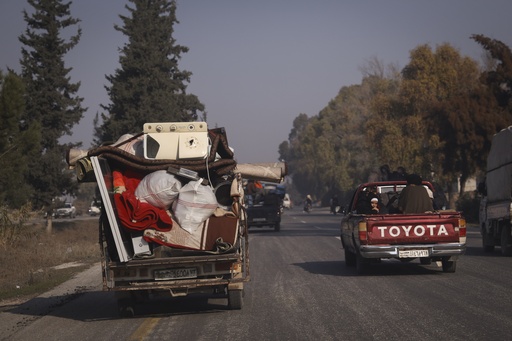ANKARA, Turkey — As opposition forces to Syrian President Bashar Assad make rapid and noteworthy advancements across Syria, Turkey remains vigilant about potential spillover effects. Sharing a lengthy border of 911 kilometers (566 miles) with Syria, Turkey has been a significant supporter of various opposition factions aiming to depose Assad since the onset of the Syrian civil war in 2011. This prolonged conflict has resulted in a substantial influx of refugees, with Turkey currently hosting approximately 3 million Syrians.
Turkish officials have categorically denied any involvement in the offensive led by Ha’yat Tahrir al-Sham, a jihadi group, along with a coalition of Turkish-backed Syrian militias known as the Syrian National Army. However, analysts contend that this operation, which seems to align with Turkey’s long-term interests, could not have proceeded without the tacit approval of Ankara. The situation allows Turkey to push back against Kurdish forces in Syria that are linked to its adversary, the Kurdistan Workers Party (PKK).
On Friday, Turkish President Recep Tayyip Erdogan pointed fingers at Assad regarding the recent developments, stating, “We had made a call to Assad. We said, ‘Come, let’s meet, let’s determine the future of Syria together.’ Unfortunately, we could not get a positive response from Assad.” Erdogan expressed discontent at the persistence of troubling dynamics in the region.
Turkey’s stance regarding the Syrian conflict emphasizes its commitment to Syria’s territorial integrity, with a particular aversion to the establishment of a Kurdish autonomous region along its border. Since 2016, Ankara has undertaken several military incursions aimed at repelling both the Islamic State and Kurdish militants, thereby creating a buffer zone, and it currently has control over parts of northern Syria. Furthermore, Turkey advocates for lowering tensions and fostering dialogue between the Assad regime and the opposition, engaging in diplomatic efforts with both Iran and Russia, which are Assad’s main allies.
Recently, Turkey has made overtures to reconcile with Assad to diminish the threat posed by Kurdish groups and facilitate the safe return of refugees. Unfortunately, these efforts have been rebuffed by Assad’s administration. Turkish officials continue to claim they are not involved in any violent escalation in Syria, calling accusations of provoking unrest “untrue” and “lies,” as highlighted by Omer Celik, spokesperson for Erdogan’s ruling party.
Despite this, analysts assert that the rebel offensive would likely have been impossible without Turkey’s implicit approval. The Turkish government has categorized Ha’yat Tahrir al-Sham as a terrorist organization but is believed to wield considerable influence over the group. According to reports, Ankara had previously delayed the offensive for several months, but opposition forces proceeded with their attack following government assaults on opposition territories, which breached existing de-escalation agreements among Turkey, Iran, and Russia.
Originally intended as a limited operation, the offensive expanded as Syrian government forces began to withdraw from their positions. Gonul Tol, an expert from the Middle East Institute, noted that while Turkey may not fully control HTS, it has provided indirect support, granting passage to humanitarian aid trucks into HTS strongholds in Idlib.
Looking ahead, Turkey faces various risks due to this offensive, including heightened tensions with Syria’s allies, Iran and Russia. As a member of NATO, Turkey is attempting to navigate a delicate balance between its relations with both Ukraine and Russia amid the ongoing conflict. Moreover, the increased instability within Syria poses the threat of a new wave of refugees heading toward the Turkish border.
Despite Russia’s focus on its war in Ukraine, analysts like Tol believe that President Vladimir Putin remains unlikely to abandon Assad, stating, “I doubt Russia is going to give up on Assad. Syria is just too important for Putin.”
The current insurgent actions have stirred hopes that Turkey could fulfill its strategic objectives in Syria by securing its border and fostering an environment conducive to the return of Syrian refugees. Since 2022, Turkey has aimed to restore diplomatic relations with Syria; however, Assad’s demand for the withdrawal of Turkish troops complicates this process. Turkish officials assert that troops will not leave while Kurdish militia threats persist.
The rebel offensive might compel Assad to consider negotiating with Turkey and the opposition, potentially enabling Turkey to push the Syrian Kurdish People’s Protection Units (YPG) further from its borders. Although the YPG has been allied with the U.S. in fighting the Islamic State, Turkey regards it as a terrorist group. Recently, another Turkish-backed faction succeeded in expelling the YPG from Tal Rifaat, north of Aleppo, with calls for further targeting the Kurdish-held city of Manbij.
Additionally, there is hope that opposition control over Aleppo could encourage the return of refugees, especially since a significant portion of the Syrian refugee population in Turkey originates from Aleppo. Nonetheless, Tol cautions that Turkey may lack control over HTS as it seeks to pursue its own agenda, raising the question of whether HTS would heed Turkey’s interests after gaining significant ground. As Tol succinctly puts it, “HTS are a wild card. Does Turkey really want a jihadist organization to be running a neighboring country?”
